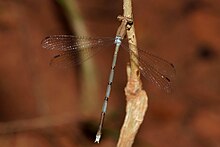| Lestes nodalis | |
|---|---|

| |
| Male | |

| |
| Female | |
| Conservation status | |
 Least Concern (IUCN 3.1) | |
| Scientific classification | |
| Domain: | Eukaryota |
| Kingdom: | Animalia |
| Phylum: | Arthropoda |
| Class: | Insecta |
| Order: | Odonata |
| Suborder: | Zygoptera |
| Family: | Lestidae |
| Genus: | Lestes |
| Species: | L. nodalis |
| Binomial name | |
| Lestes nodalis Selys, 1891 | |

Lestes nodalis is a species of damselfly in the family Lestidae, the spreadwings.
Distribution
It is native to India, Thailand and China.
According to Fraser (1933), the distribution in India is limited to Northeast India, mainly in Assam. Later Mitra (2010) recorded it from Odisha, Bihar and Manipur. Ashish Tiple (2014) recorded it from Maharastra. In 2011, K.G. Emiliyamma and Muhamed Jafer Palot found both a male and female at Narayamkulam, Kozhikode in Kerala. This conforms the range of distribution of this species extends to South India too.
Description and habitat
It is a medium sized damselfly with brown eyes. Its thorax is brown on dorsum and paler on lateral sides. Wings are transparent with bi-colored pterostigma, blackish-brown at centre and yellow along the sides. Its abdomen is brown with black apical annules up to segment 6. Segment 7 and 8 are dark brown. Segment 9, 10 and anal appendages are pale; bluish when aged. The pale colors on the thorax and abdomen are also get bluish due to pruinescence when aged. Female is similar to the male. Its dull colours may render it very inconspicuous, so that it can be easily overlooked. The bi-colored pterostigma and the broad right-angled anal appendages easily help to distinguish it from other species.
It breeds in shallow marshes and possibly well vegetated ponds.
See also
References
- ^ Dow, R.A. (2010). "Lestes nodalis". IUCN Red List of Threatened Species. 2010: e.T180100A7642299. doi:10.2305/IUCN.UK.2010-4.RLTS.T180100A7642299.en. Retrieved 20 November 2021.
- Paulson, D.; Schorr, M.; Abbott, J.; Bota-Sierra, C.; Deliry, C.; Dijkstra, K.-D.; Lozano, F. (2024). "World Odonata List". OdonataCentral, University of Alabama.
- ^ C FC Lt. Fraser (1933). The Fauna of British India, including Ceylon and Burma, Odonata Vol. I. Red Lion Court, Fleet Street, London: Taylor and Francis. pp. 51-53.
- Tiple, Dr Ashish. "New Record of Damselfly Lestes nodalis Selys (Odonata: Lestidae) from Central India". academia. Retrieved 2017-03-09.
- K.G. Emiliyamma; Muhamed Jafer Palot (2016). "Range extension of Lestes nodalis Selys, 1891 (Odonata: Zygoptera: Lestidae) in southern India". Journal of Threatened Taxa. 8 (2): 8528–8530. doi:10.11609/jott.2573.8.2.8528-8530. Retrieved 2017-03-09.
- K.A., Subramanian; K.G., Emiliyamma; R., Babu; C., Radhakrishnan; S.S., Talmale (2018). Atlas of Odonata (Insecta) of the Western Ghats, India. Zoological Survey of India. pp. 40–41. ISBN 9788181714954.
- Subramanian, K. A. (2005). Dragonflies and Damselflies of Peninsular India - A Field Guide.
- "Lestes nodalis Selys, 1891". India Biodiversity Portal. Retrieved 2017-03-09.
- "Lestes nodalis Selys, 1891". Odonata of India, v. 1.00. Indian Foundation for Butterflies. Retrieved 2017-03-09.
External links
 Data related to Lestes nodalis at Wikispecies
Data related to Lestes nodalis at Wikispecies Media related to Lestes nodalis at Wikimedia Commons
Media related to Lestes nodalis at Wikimedia Commons
| Taxon identifiers | |
|---|---|
| Lestes nodalis | |
This article related to Lestoidea is a stub. You can help Misplaced Pages by expanding it. |